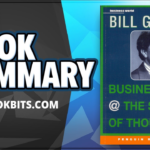♣ CLICK THIS TO STOP TRYING TO ACHIEVE YOUR GOALS BY YOURSELF AND BE COACHED TODAY HERE
♥ CLICK THIS TO DOWNLOAD THIS FREE PDF SUMMARY HERE
♦ CLICK THESE FOR THE FOLLOWING Book | Summaries | Course
YouTube |Spotify | Instagram | Facebook | Newsletter | Website
The Snowball: Warren Buffett and the Business of Life
Alice Schroeder
Humility disarms.
“I will be talking about pricing stocks, but I will not be talking about predicting their course of action next month or next year. Valuing is not the same as predicting.
In the short run, the market is a voting machine. In the long run, it’s a weighing machine.
Weight counts eventually. But votes count in the short term. And it’s a very undemocratic way of voting. Unfortunately, they have no literacy tests in terms of voting qualifications, as you’ve all learned.”
“Interest rates — the cost of borrowing — are the price of “when.” They are to finance as gravity is to physics. As interest rates vary, the value of all financial assets — houses, stocks, bonds — changes, as if the price of birds have fluctuated.
And that’s why sometimes a bird in the hand is better than two birds in the bush, and sometimes two in the bush are better than one in the hand.”
Praise by name, criticize by category.
About Munger & Buffett:
They thought alike and had the same fascination with business as a puzzle worth spending a lifetime to solve. Both regarded rationality and honesty as the highest virtues.
They liked to ponder the reasons for failure as a way of deducing the rules of success.
“Tell me where I’m going to die, so I won’t go there.” — Charlie Munger
About Shoe Button Complex:
“My father commuted daily with the same group of men. One of them had managed to corner the market in shoe buttons — a really small market, but he had it all. He pontificated on every subject, all subjects imaginable. Cornering the market on shoe buttons made him an expert on everything. Warren and I (Munger) have always sensed it would be a big mistake to behave that way.”
♣ CLICK THIS TO STOP TRYING TO ACHIEVE YOUR GOALS BY YOURSELF AND BE COACHED TODAY HERE
♥ CLICK THIS TO DOWNLOAD THIS FREE PDF SUMMARY HERE
♦ CLICK THESE FOR THE FOLLOWING Book | Summaries | Course
YouTube |Spotify | Instagram | Facebook | Newsletter | Website
About Warren’s Circle of Competence:
“He believed in what he called the Circle of Competence, drew a line around himself, and stayed within the three subjects on which he would be recognized as an absolute expert: money, business and his own life.”
Warren on the Inner Scorecard:
“The big question about how people behave is whether they’ve got an Inner Scorecard or an Outer scorecard. It helps if you can be satisfied with an Inner Scorecard. I always pose it this way. I say: “Look. Would you rather be the world’s greatest lover, but have everyone think you’re the world’s worst lover? Or would you rather be the world’s worst lover but have everyone think you’re the world’s greatest lover? Now, that’s an interesting question.
… In teaching your kids, I think the lesson they’re learning at a very, very early age is what their parents put the emphasis on. If all the emphasis is on what the world’s going to think about you, forgetting about how you really behave, you’ll wind up with an Outer Scorecard. Now, my dad: He was a hundred percent Inner Score-card guy.
He was really a maverick. But he wasn’t a maverick for the sake of being a maverick. He just didn’t care what other people thought. My dad taught me how life should be lived. I’ve never seen anybody quite like him.”
The Buffett Family Motto:
“Spend less than you make. Don’t go into debt.”
By the time Warren entered kindergarten, his hobbies and interests revolved around numbers. Around age six, he became fascinated by the precision of measuring time in seconds, and desperately wanted a stopwatch.
He filled the bathtub with water and picked up his marbles. Each had a name. He lined them up on the flat edge at the back of the tub. Then he clicked the stopwatch just as he swept the marbles into the water. They raced down the porcelain slope, clicking and rattling, jumping as they hit the waterline. The marbles chased each other towards the stopper. When the first one hit, Warren punched the stopwatch and declared the winner.
His sisters watched him race the marbles over and over, trying to improve their times. The marbles never tired, the stopwatch never erred, and — unlike his audience — Warren never seemed bored by the repetition.
He was learning to calculate odds. Warren looked around him. There were opportunities to calculate odds everywhere. The key was to collect information, as much information as you could find.
Warren liked anything that involved collecting, counting and memorizing numbers. He loved to read and spent many hours with books he checked out of the Benson Library.
Warren’s fondness for minutiae continued to develop. By fifth grade, he had immersed himself in the 1939 World Almanac, which quickly became his favourite book. He memorized the population of every city. He got a contest going on with Stu (his friend) over who could name the most world cities with populations over a million.
He wanted money.
“It could make me independent. Then I could do what I wanted to do with my life. And the biggest thing I wanted to do was work for myself. I didn’t want other people directing me. The idea of doing what I wanted to do every day was important to me.”
Enlisting his sister Doris as a partner, he bought three shares of a stock for each of them, costing him $114.75 for his three shares of Cities Service Preferred.
“I didn’t understand that stock very well when I bought it,” he says; he knew only that it was a favourite stock that Howard had sold to his customers for years.
The market hit a low that June, and Cities Service Preferred plunged from $38.25 to $27 a share. Doris “reminded” him every day on the way to school that her stock was going down. Warren says he felt terribly responsible.
When the stock finally recovered, he sold at $40, netting a $5 profit for the two of them. But Cities Service quickly soared to $202 a share.
Warren learned three lessons and would call this episode one of the most important in his life.
One lesson was not to overly fixate on what he had paid for a stock. The second was not to rush unthinkingly to grab a small profit. The third was about investing other people’s money. If he made a mistake, it might get somebody upset at him. So he didn’t want to have responsibility for anyone else’s money unless he was sure he could succeed.
♣ CLICK THIS TO STOP TRYING TO ACHIEVE YOUR GOALS BY YOURSELF AND BE COACHED TODAY HERE
♥ CLICK THIS TO DOWNLOAD THIS FREE PDF SUMMARY HERE
♦ CLICK THESE FOR THE FOLLOWING Book | Summaries | Course
YouTube |Spotify | Instagram | Facebook | Newsletter | Website
One of them (books) was special — a paperback written by former salesman Dale Carnegie, enticingly titled How to Win Friends and Influence People. He had discovered it at age eight or nine.
Warren’s heart lifted. He thought he had found the truth. This was a system. He felt so disadvantaged socially that he needed a system to sell himself to people, a system he could learn once and use without having to respond in a new way to each changing situation.
But it took numbers to prove that it actually worked. He decided to do a statistical analysis of what happened if he did follow Dale Carnegie’s rules, and what happened if he didn’t.
He tried giving attention and appreciation, and he tried doing nothing or being disagreeable. People around him did not know he was performing experiments on them in the silence of his own head, but he watched how they responded. He kept track of his results. Filled with a rising joy, he saw what the numbers proved. The rules worked.
Unlike most people who read Carnegie’s book and thought, gee that makes sense, then set the book aside and forgot about it, Warren worked at this project with unusual concentration; he kept coming back to these ideas and using them.
Even when he failed and forgot and went for long stretches without applying himself to the system, he returned and resumed practicing in the end.
On Warren’s skill at horse handicapping:
Warren read hundreds of books on horse handicapping. He sent away to a place in Chicago on North Clark Street where you could get old racing forms, months of them, for very little. They were old, so who wanted them? He would go through them, using his handicapping techniques to handicap one day and see the next day how it worked out.
He ran tests of his handicapping ability day after day, all these different systems he had in his mind.
Warren thought of all businesses this way. The employees who managed the business shared in the earnings that their labours produced. But they were accountable to their owners, and it was the owners who got the gains as the value of the business increased. Of course, if the employees bought stock themselves, they became owners, too, and partners with other capitalists. But no matter how much stock they owned, as employees their job required them to report to the owners how well they had done.
Thus, Warren saw a shareholder meeting as a time of accounting for the stewardship of the managers.
As Graham’s seminar approached, Warren started memorizing everything he could find out about Ben Graham’s method, his books, his specific investments, and Graham himself.
From Graham’s class, Warren took away 3 main principles:
- A stock is the right to own a little piece of a business. A stock is worth a certain fraction of what you would be willing to pay for the whole business.
- Use a margin of safety. Investing is built on estimates and uncertainty. A wide margin of safety ensures that the effects of good decisions are not wiped out by errors. The way to advance, above all, is by not retreating.
- Mr Market is your servant, not your master. Graham postulated a moody character called Mr. Market, who offers to buy and sell stocks every day, often at prices that don’t make sense. Mr Market’s moods should not influence your view of price. However, from time to time he does offer the chance to buy low and sell high.
Warren was a very focused person. He could focus like a spotlight, twenty-four hours a day almost, seven days a week almost. I don’t know when he slept.
He could quote Graham’s examples and come up with examples on his own. He haunted the Columbia library, reading old newspapers for hours on end.
“I would get these papers from 1929. I couldn’t get enough of it. I read everything — not just the business and stock-market stories. History is interesting, and there is something about history in a newspaper, just seeing a place, the stories, even the ads, everything. It takes you into a different world, told by somebody who was an eyewitness, and you are really living in that time.”
Warren spent hours reading the Moody’s and Standard & Poor’s manuals, looking for stocks.
“I learned that it pays to hang around with people better than you are, because you will float upward a little bit. And if you hang around with people that behave worse than you, pretty soon you’ll start sliding down the pole. It just works that way.”
“I went through the Moody’s manuals page by page. Ten thousand pages in the Moody’s Industrial, Transportation, Banks and Finance Manuals — twice. I actually looked at every business — although I didn’t look very hard at some.”
In that first month, he had parked himself in the file room at Graham-Newman and begun to read through every single piece of paper in every single drawer in an entire room filled with big wooden files.
He had learned the value of gathering as much as possible of something scarce. From license platers to nuns’ fingerprints to coins and stamps, to the Union Street Railway, and National American, he had always thought his way, a born collector.
“You should never, when facing some unbelievable tragedy, let one tragedy increase into two or three through your failure of will.”
“Charlie (Munger), as a very young lawyer, was probably getting $20 an hour. He thought to himself, “Who’s my most valuable client?” And he decided it was himself. So he decided to sell himself an hour each day. He did it early in the morning, working on these construction projects and real estate deals. Everybody should do this, be the client, and then work for other people, too, and sell yourself an hour a day.”
And he no longer asked people to invest with him. They had to bring it up. It had to be their idea. People not only would have no inkling what he was doing, they had to put themselves in this position. It converted them into enthusiasts for Buffett, and reduced the odds of their complaining about anything he did. Instead of asking a favour, he was granting one; people felt indebted to him for taking their money. Making people ask put him psychologically in charge.
He was always adding one more thing to his list, but unlike her (Susie Buffett) he never overextended himself. When something new came into his life, something else went out. The two exceptions were money and friends.
“Buying the right company (with the right prospects, inherent industry conditions, management, etc.) means “the price will take care of itself…” This is what causes the cash register to really sing. However, it is an infrequent occurrence, as insights usually are, and of course, no insight is required on the quantitative side — the figures should hit you over the head with a baseball bat. So the really big money tends to be made by investors who are right on qualitative decisions.”
Warren had strong views about specialization; he defined his special skills as thinking and making money.
Warren disciplined himself to maintain his own weight by dangling money in front of his kids. When they were younger, he made out unsigned checks to them for $10,000 and said that if he didn’t weigh 173 pounds on such-and-such a date, he would sign the checks.
Little Susie and Howie went crazy trying to tempt him with ice cream and chocolate cake. But the prospect of giving up money pained Warren far more than giving up a treat. He made out those checks over and over, but he never had to sign a single one.
They (Buffett & Munger) wanted businesses that would marmalade them with money, businesses that had some sort of sustainable competitive advantage and could outwit the natural cycle of capital creation and destruction as long as possible.
“Time is the friend of the wonderful business, the enemy of the mediocre… It’s far better to buy a wonderful company at a fair price than a fair company at a wonderful price. Charlie understood this early; I was a slow learner. But now, when buying companies or common stocks, we look for first-class businesses accompanied by first-class managements. That leads right into a related lesson: good jockeys will do well on good horses but not on broken-down nags.”
When Warren got obsessed with something — especially someone new — he could not stop thinking about it or them; this came across to a new person as a wholehearted, flattering, and even overwhelming attentiveness.
♣ CLICK THIS TO STOP TRYING TO ACHIEVE YOUR GOALS BY YOURSELF AND BE COACHED TODAY HERE
♥ CLICK THIS TO DOWNLOAD THIS FREE PDF SUMMARY HERE
♦ CLICK THESE FOR THE FOLLOWING Book | Summaries | Course
YouTube |Spotify | Instagram | Facebook | Newsletter | Website
Walter Annenberg’s stance of philanthropy:
He thought rich people should give it all away before they died lest their appointed stewarts dishonor their obligations.
Buffett had the energy and enthusiasm of a restless teenager; he seemed to remember every fact and figure he had ever read; he finagled people into volunteering for tough jobs, then assumed they could accomplish miracles; and while remarkably tolerant of others’ quirks and flaws, he was less so of quirks and flaws that cost him money. So eager for results was he, so confident of others’ skills, so unaware of how far short of his own they fell, that he chronically underestimated people’s workloads.
His trick of management being to find obsessed perfectionists like himself who worked incessantly.
In making ethical decisions:
“If you’re not sure if something is right or wrong, consider whether you’d want it reported in the morning paper.”
He (Warren Buffett) was a likable boss who never lost his temper, never changed his money capriciously, never said a rude word to anyone, never berated or criticized his employees, didn’t second guess people on their work, and let them do their jobs without interference. He also operated on the assumption that if someone was smart, they could do anything.
“I don’t get in fights just to get in fights.”
Buffett also thoughts in black-and-white terms about honesty; he had no tolerance for liars and cheaters.
“Lose money for the firm, and I will be understanding. Lose a shred of reputation for the firm, and I will be ruthless.”
“I was at my best at giving financial advice when I was twenty-one years old and people weren’t listening to me. I could have gotten up there and said the most brilliant things and not very much attention would have been paid to me. And now I can say the dumbest things in the world and a fair number of people will think there’s some great hidden meaning to it or something.”
It is unclear how many people at the table understood “focus” as Buffett lived that word. This kind of innate focus couldn’t be emulated. It meant the intensity that is the price of excellence. It meant the discipline and passionate perfectionism that made Thomas Edition the quintessential American inventor, Walt Disney the king of family entertainment, and James Brown the Godfather of Soul. It meant single-minded obsession with an ideal.
Buffett’s Institutional Imperative:
The tendency for companies to engage in activity for its own sake and to copy their peers instead of trying to stay ahead of them.
Munger often attributed much of Buffett’s success to the fact that he was a “learning machine.” Their common intellect, interests and way of thinking gave them considerable common ground. They shared the same intensity.
Andrew Carnegie’s stance of philanthropy:
“He who dies rich dies disgraced.”
“The people who say, “I did it all myself,” and think of themselves as Horatio Alger — believe me, they’d bid more to be in the United States than in Bangladesh. That’s the Ovarian Lottery.”
Rule number one: don’t lose money. Rule number two: don’t forget rule number one. Rule number three: don’t go into debt.
“Let’s say that when I turned sixteen, a genie had appeared to me. And that genie said, “Warren, I’m going to give you the car of your choice. It’ll be here tomorrow morning with a big bow tied on it. Brand-new. And it’s all yours.”
Having heard all the genie stories, I would say, “What’s the catch?” And the genie would answer, “There’s only one catch. This is the last car you’re ever going to get in your life. So it’s got to last a lifetime.”
“If that had happened, I would have picked out that car. But, can you imagine, knowing it had to last a lifetime, what I would do with it?
I would read the manual about five times. I would always keep it garaged. If there was the least little dent or scratch, I’d have it fixed right away because I wouldn’t want it rusting. I would baby that car, because it would have to last a lifetime.
That’s exactly the position you are in concerning your mind and body. You only get one mind and one body. And it’s got to last a lifetime. Now, it’s very easy to let them ride for many years. But if you don’t take care of that mind and that body, they’ll be a wreck forty years later, just like the car would be.
It’s what you do right now, today, that determines how your mind and body will operate ten, twenty and thirty years from now.”
“People ask me where they should go to work, and I always tell them to go to work for whom they admire the most,”
“It’s crazy to take little in-between jobs just because they look good on your resume. That’s like saving sex for your old age. Do what you love and work for whom you admire the most, and you’ve given yourself the best chance in life you can.”
“You’d get very rich if you thought of yourself as having a card with only twenty punches in a lifetime, and every financial decision used up one punch. You’d resist the temptation to dabble. You’d make more good decisions and you’d make more big decisions.”
He ran his life on Twenty Punches too, with as little flitting as he could arrange. Same house, same wife for fifty years, same Astrid on Farnam Street; no desire to buy and sell real estate, art, cars, tokens of wealth; no jumping from city to city or career to career. When he gave somebody a punch on his card, they became a part of him and that decision was permanent.
“Cash combined with courage in a crisis is priceless.”
As requests for his time grew, his view that commitments are sacred and his natural inclination to conserve energy saved him from succumbing to the flattery of being in demand.
If he added something to his schedule, he discarded something else. He never rushed. His friends could pick up the phone and call him whenever he liked. He kept his phone calls warmhearted and short. When he was ready to stop talking, the conversation simply died. The kind of friends he had didn’t abuse the privilege. While he had many fond acquaintances, he added true friends only at intervals of years.
♣ CLICK THIS TO STOP TRYING TO ACHIEVE YOUR GOALS BY YOURSELF AND BE COACHED TODAY HERE
♥ CLICK THIS TO DOWNLOAD THIS FREE PDF SUMMARY HERE
♦ CLICK THESE FOR THE FOLLOWING Book | Summaries | Course
YouTube |Spotify | Instagram | Facebook | Newsletter | Website
“The ideal business is one that earns very high returns on capital and that keeps using lots of capital at those high returns. That becomes a compounding machine.
So if you had your choice, if you could put a hundred million dollars into a business that earns twenty percent on that capital — twenty million — ideally, it would be able to earn twenty percent on a hundred twenty million the following year and on a hundred forty-four million the following year and so on. You could keep redeploying capital at [those] same returns over time. But there are very, very, very few businesses like that… we can move that money around from those businesses to buy more businesses.”
“Basically, when you get to my age, you’ll really measure your success in life by how many of the people you want to have love you actually do love you.
I know people who have a lot of money, and they get testimonial dinners and they get hospital wings named after them. But the truth is that nobody in the world loves them. If you get to my age in life and nobody thinks well of you, I don’t care how big your bank account is, your life is a disaster.
That’s the ultimate test of how you have lived your life. The trouble with love is that you can’t buy it. You can buy sex. You can buy testimonial dinners. You can buy pamphlets that say how wonderful you are. But the only way to get love is to be lovable. It’s very irritating if you have a lot of money. You’d like to think you could write a check: I’ll buy a million dollars’ worth of love.
But it doesn’t work that way. The more you give love away, the more you get.”
Charlie Munger:
“Invert, always invert. Turn a situation or problem upside down. Look at it backward. What’s in it for the other guy? What happens if all our plans go wrong? Where don’t we want to go, and how do you get there? Instead of looking for success, make a list of how to fail instead — through sloth, envy, resentment, self-pity, entitlement, all the mental habits of self-defeat. Avoid these qualities and you will succeed.
Tell me where I’m going to die, that is, so I don’t go there.”
“If you go from the first floor to the hundredth floor of a building, and then go back to the ninety-eighth, you’ll feel worse than if you’ve just gone from the first to the second, you know. But you’ve got to fight that feeling, because you’re still on the ninety-eighth floor.”
“You absolutely never want to be in a position where tomorrow morning you have to depend on the kindness of strangers in the financial world. I spent a lot of time thinking about that. I never want to have to come up with a billion dollars tomorrow morning. Well, a billion I could. But any significant amount. Because you just cannot be sure of anything. You have to think about things that have never happened before. You always want to have plenty of money around.”
That passion had led him to study a universe of thousands of stocks. It made him burrow into libraries and basements for records nobody else troubled to get. He sat up nights studying hundreds of thousands of numbers that would glaze anyone else’s eyes. He read every word of several newspapers each morning and sucked down the Wall Street Journal like his morning Pepsi, then Coke.
He dropped in on companies, spending hours talking about barrels with the woman who ran an outpost of Greif Bros. Cooperage or auto insurance with Lorimer Davidson. He read magazines like the Progressive Grocer to learn how to stock a meat department. He stuffed the backseat of his car with Moody’s Manuals and ledgers on his honeymoon. He spent moneys reading old newspapers dating back a century to learn the cycles of business, the history of Wall Street, the history of capitalism, the history of the modern corporation.
He followed the world of politics intensely and recognized how it affected businesses. He analyzed economic statistics until he had a deep understanding of what they signified. Since childhood, he had read every biography he could find of people he admired, looking for the lessons he could learn from their lives. He attached himself to everyone who could help him and coattailed anyone he could find who was smart.
He ruled out paying attention to almost anything but business — art, literature, science, travel, architecture — so that he could focus on his passion. He defined a circle of competence to avoid making mistakes. To limit risk he never used any significant amount of debt. He never stopped thinking about business: what made a good business, what made a bad business, how they competed, what made customers loyal to one versus another.
He had unusual way of turning problems around in his head, which gave him insights nobody else had. He developed a network of people who — for the sake of his friendship as well as his sagacity — not only helped him but also stayed out of his way when he wanted them to. In hard times or easy, he never stopped thinking about ways to make money.
And all of this energy and intensity became the motor that powered his innate intelligence, temperament and skills.
♣ CLICK THIS TO STOP TRYING TO ACHIEVE YOUR GOALS BY YOURSELF AND BE COACHED TODAY HERE
♥ CLICK THIS TO DOWNLOAD THIS FREE PDF SUMMARY HERE
♦ CLICK THESE FOR THE FOLLOWING Book | Summaries | Course
YouTube |Spotify | Instagram | Facebook | Newsletter | Website













